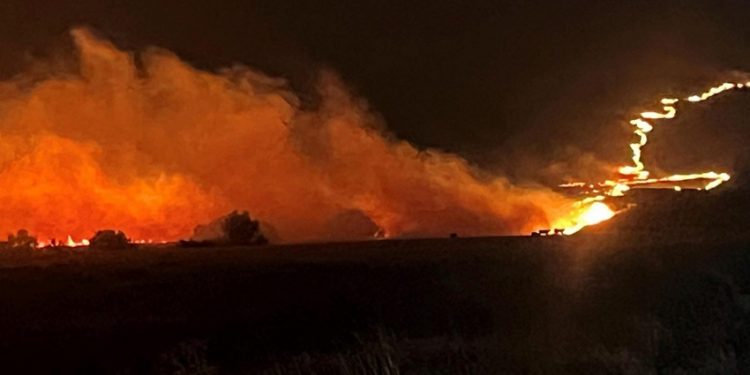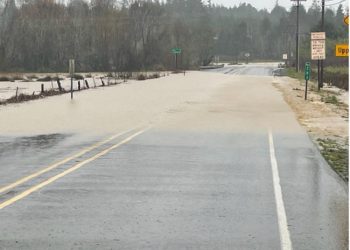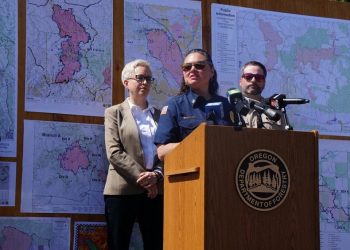Astoria, OR – Oregon lawmakers moved quickly to address the state’s wildfire funding crisis Thursday, passing a bill that allocates $218 million in emergency taxpayer funds to cover costs from a record-breaking fire season. The emergency funding, approved during a special legislative session, aims to pay off nearly $100 million in unpaid bills from contractors who provided critical firefighting services throughout the year.
The 2024 wildfire season in Oregon has been one of the most costly and destructive in the state’s history, with more than 1.9 million acres burned. The state’s forestry department and the Office of State Fire Marshal, which handle the bulk of firefighting efforts, have faced severe financial strain as they worked to control over 1,000 fires, including six major blazes, or “megafires,” each exceeding 100,000 acres.
State officials say they simply don’t have enough immediate cash on hand to pay the contractors, many of whom have been waiting for months to be compensated for their work. “We just don’t have enough cash on hand to pay the folks who came out this year and worked thousands of hours protecting their neighbors and community members,” said Joy Krawczyk, a spokesperson for the Oregon Department of Forestry.
The state’s fire response system is divided into two main funding categories. “Base” funding, which is shared between the state and property owners whose land is under state protection, is used to manage smaller fires. For larger fires, a separate fund is tapped, with the state and landowners covering the first $20 million, and the remainder being backfilled by the state’s general fund. This year, the state’s costs for large fires ballooned to $352 million, a staggering $212 million increase from the previous record set in 2020.
Though the federal government is expected to cover nearly 60% of those costs, payments from federal agencies can take years to process, leaving the state to struggle with short-term funding gaps. As a result, the special session was called to quickly address the immediate financial needs, with Senate Bill 5801 passing with little opposition.
The emergency funding bill passed almost unanimously, with bipartisan support from lawmakers who agreed that the state must settle its outstanding debts. However, the special session also highlighted divisions over the root causes of the state’s escalating fire-related expenses.
Republicans, particularly those from rural areas, have criticized the state’s forest management policies, which they say contribute to the growing severity of fire seasons. State Rep. Ed Diehl, R-Scio, blamed policies that restrict logging on state lands, calling them “tinderboxes” that fuel the intensity and cost of wildfires. “We have turned a billion-dollar asset into a billion-dollar liability,” Diehl said during the session.
State Sen. Lynn Findley, R-Vale, also raised concerns about the lack of transparency from the Oregon Department of Forestry, accusing the agency of failing to keep lawmakers informed about the mounting financial pressures. He called for the resignation of State Forester Cal Mukumoto, adding, “We have vendors in the state of Oregon that we, the State of Oregon, hired months and months ago, and we have not paid that bill.”
Democratic lawmakers, while acknowledging the escalating costs, took a less combative approach, focusing on the need to better prepare for future fire seasons. State Rep. Paul Evans, D-Monmouth, emphasized that the state’s fire response system must be updated to account for the effects of climate change and the growing frequency of catastrophic wildfires. “We need to adjust how we project [costs] moving forward,” Evans said.
Sen. Bill Hansell, R-Athena, who represents a region heavily affected by wildfires, cautioned that the state must act swiftly to prevent future disruptions to firefighting efforts. “Next year, we’re probably going to need some additional help for the fire season that’s coming up,” Hansell said. “If we don’t pay our bills now, why would anyone want to come and help us next year?”
The emergency funding bill also shed light on the broader challenges facing Oregon’s wildfire response system. For nearly a decade, state officials and policymakers have discussed updating how wildfires are funded and managed, but a comprehensive overhaul has yet to be implemented. The 2024 fire season, which began with a relatively mild spring but escalated rapidly during the summer, has underscored the urgency of these conversations.
State Sen. Fred Girod, R-Silverton, who lost his home in the 2020 Santiam Canyon fire, made an emotional appeal for greater attention to wildfire prevention and response. “Nothing compares to that,” Girod said, reflecting on the trauma of losing everything to the fire. “It really hurts that fire is such a low priority in this state that we can’t even afford to pay the contractors we hired.”
With another fire season on the horizon, lawmakers are bracing for more intense and costly fires, and discussions about reforming Oregon’s wildfire funding system are expected to dominate the legislative agenda when the regular session begins in January.
As the 2024 fire season winds down, the state’s firefighting agencies are left with the daunting task of managing the financial aftermath of one of the worst wildfire years on record, while policymakers prepare to tackle the root causes of the growing crisis in the coming months.













